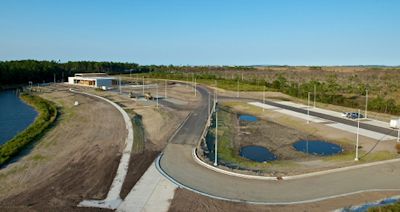Reprinted from the Outer Banks Voice
 The new $32 million campus of the Coastal Studies Institute sits on 217 acres. |
SKYCO — The University of North Carolina’s Coastal Studies Institute is slated to open the doors to its Outer Banks Campus in November, finally giving the institute a home to continue the research and education programs it has been conducting in Dare County since 2003.
Nancy White, the institute’s director, said construction of the $32 million facility on N.C. 345 in Skyco is expected to be completed in the next couple of weeks.
Supporter Spotlight
Faculty and staff will move in during November, with a dedication of the buildings likely sometime in December.
The campus sits on 217 acres of mostly marshland. A 60,000-square-foot research building with classrooms and a lab is constructed on about 35 acres of upland, along with a 16,000-square-foot marine operations building.
The research institute has had a presence in Manteo and Nags Head for nearly a decade and conducts about $6 million in grant-funded research and education annually in coastal North Carolina, White said.
The institute was started in Dare County to fill a research gap in northeastern North Carolina, particularly as it relates to coastal development and its pressure on natural resources. Faculty and staff have been operating out of office space in Manteo and a makeshift lab in Nags Head.
The new campus will be one of three other university-based marine science research facilities strategically located along the N.C. coast.
Supporter Spotlight
 Nancy White |
The institute, which partners with five state universities, focuses on four main areas of research: estuarine ecology and human health, coastal engineering and ocean energy, public policy and coastal sustainability and maritime heritage.
Because of budget shortfalls, White said, initial plans for an auditorium and dormitories have been put on hold.
“We are still pursuing those projects,” she said, adding that the institute hoped to gather enough money over the next several years through state and private funding.
The Skyco campus will provide a venue for seminars, workshops and intensive research.
White said the community will see the effects of the institute’s work increase, particularly in areas of shoreline erosion, maritime research and education.
The institute has started a number of programs in K-12 schools in northeastern North Carolina, including estuarine ecology and aquaculture programs at Cape Hatteras Secondary School, the Build an Observation Buoy program to study water quality and the constructed wetlands project at Manteo High School. The institute was also instrumental in getting local high schools involved in the Remotely Operated Vehicle Workshop and Competition, White said.
While the institute has worked in supporting curriculum at local schools in the past, the new facility will enhance field-based learning opportunities, she added.
Also, White said, the institute’s top-rated dive program will now be complemented with the addition of the advanced media lab at the facility with high-resolution videography capabilities. The lab will allow laypeople to get a first-hand look at shipwrecks and other underwater videography.







